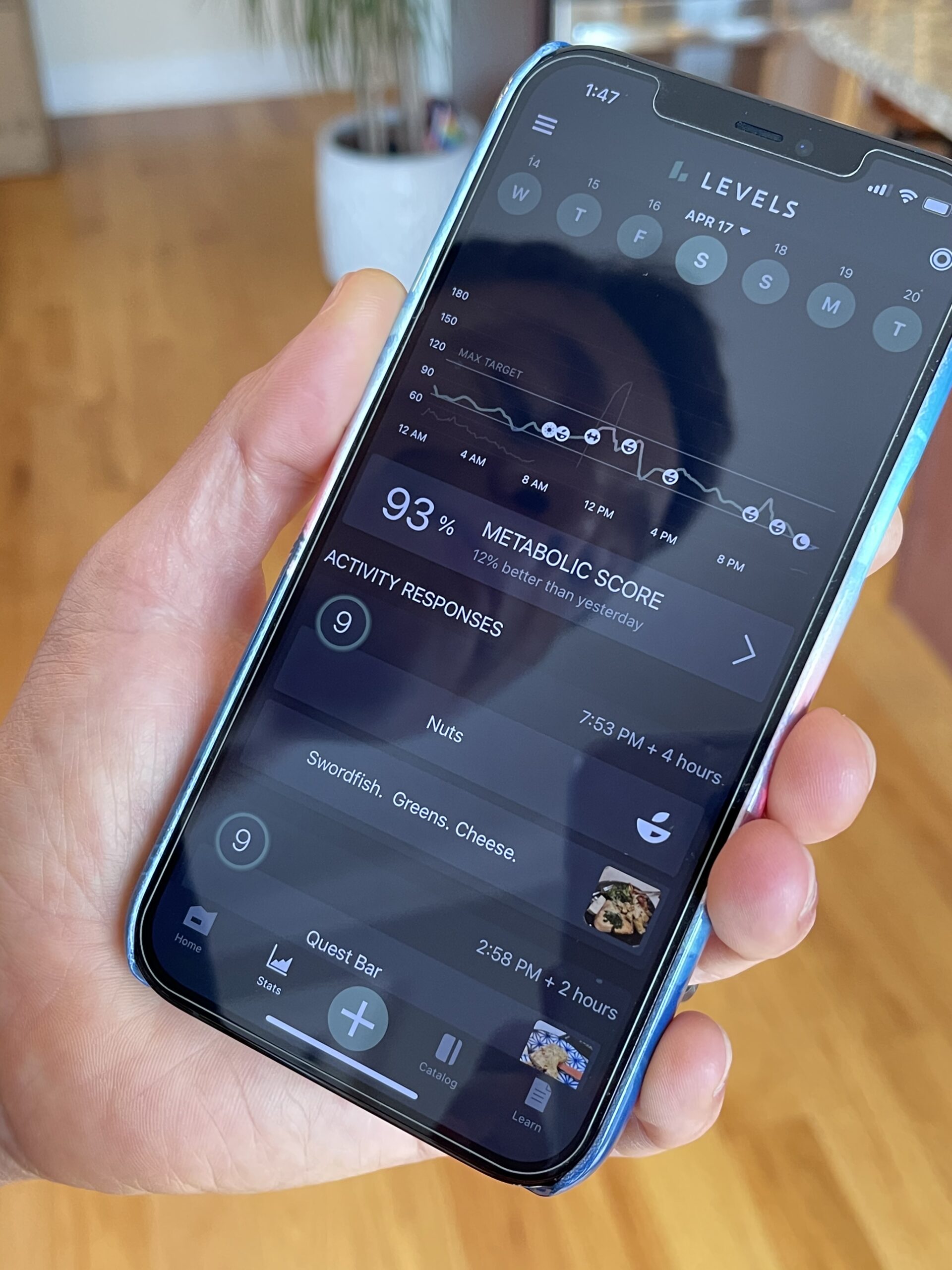Table of Contents
Part 1 – What is Levels Health: Hardware & Software
Part 2 – Pro’s, Con’s, & Big Takeaways
Part 3 – Levels’ Health Claim & Who Is It Good For
Part 4 – Data Tracking & Wearable Devices
Part 5 – Does Levels Health Live Up to the Hype
Can the Levels Health continuous glucose monitor improve your metabolism, help you lose weight, and get you strong and lean? Is this tiny device stuck to your arm for a month worth the price and hassle?
Be sure to read Parts 1-4 for the complete no-nonsense review of the Levels Health philosophy, app, and journey through their 28-day metabolic fitness program. In part 5, you will learn whether Levels Health will forever transform the way you eat or become another wearable tech destined for the dumpster.
Conclusion: Does Levels Health Live Up To The Hype?
According to the app, my metabolic fitness improved by 18% over the month. As you can see by the image below, in my last week using Levels Health, I was getting much better scores. These scores are primarily looking at your median blood sugar and its variability — two markers that have been correlated with good metabolic health.

After 28 days of tracking and self-experimentation, my average blood glucose levels went down 12%. Although this is not a huge change, such an improvement seemed significant since I was already eating a low sugar diet (see image below).

Having fewer high glucose events over the course of the week is beneficial for your metabolic health. The Levels Health app allows you to track this and educate yourself about what these blood sugar numbers mean. It gives you plenty of opportunities for improvement, but it’s up to you to decide what to do with that information.
If anything, the Levels Health program left me with more questions than answers about what is metabolically healthy. I was intrigued by the way factors like sleep quality, stress levels, and microbiome health impact my ability to metabolize what I ate. But the app is not sophisticated or granular enough to tease the factors apart.
For example, did those cookies spike your blood sugar because they contained a lot of simple carbohydrates? Or did they spike your blood sugar because you didn’t sleep well last night, had a fight with your partner, and ate them too fast?
This is a mystery that the Levels Health app cannot answer by itself. To be fair, it never claimed it could.

Levels Health Gets You To See What You Never Saw Before
I enjoyed how the Levels Health program allowed me to see what is otherwise invisible — a glimpse into my metabolic health that I never had before. With the right mindset, the app empowered me to become a better caretaker of my body. It enabled me to partner with my biology rather than fight against it. I no longer needed to make decisions about food and exercise based solely upon hunches and assumptions. I had actual data to work with.
The challenge is learning how to not get overly attached to the numbers. It takes a well-balanced mind to use the numbers in wise and constructive ways. Levels Health can move you towards asking what is possible here now that I have new data. Alternatively, it can pigeonhole you into more rigid thinking about your diet or exercise. If you’re willing to let go of the need to be right and actually learn from what it’s telling you, Levels may indeed upgrade your metabolic health.
Epilogue: The Future of Wearable Devices?

In the not too distant future, we will have minimally invasive devices that can capture more about our bodies than we could ever perceive.
A more complete picture of what’s going on inside of us can certainly be beneficial.
However, if we become dependent on devices to tell us how we’re feeling because we’re too disconnected to figure it out ourselves, we’re on the road to becoming disembodied cyborgs, using tech to diminish our humanity rather than enhance it.
Jeff Siegel
Any data gathered from a wearable device will be crushed by an algorithm that is likely to be based on reductionist models of physiology. It certainly could measure your metabolic health, but that doesn’t capture all the mental, emotional, and spiritual facets of your wellbeing. Metabolic data will always be a partial picture of what is true regarding your quality of life.
Does That Make Devices Like Levels Health Worthless?
No, far from it. Data only becomes dangerous when it is used to control or dominate your body. I’m not saying the Levels Health blood sugar monitor shouldn’t be used to help you maintain good blood sugar levels. I’m advocating awareness of becoming overly dependent or attached to this data.
As I say in the article Stepping Out of Fitness Reductionism, data from wearables should never dictate your behavior. They should be used in service of your wisdom, not a surrogate for it.

The objective eye of science can only take us so far into the depth of our humanity. Data can create knowledge. But knowledge that is embedded in a reductionist view of your body as a machine overlooks so much of what it means to be alive.
Until we have a way to integrate scientific knowledge from your wearable device into a whole-person approach to health, we will forever be limited. I’m not advocating less tech or data. I’m advocating more heart to guide the use of that data.
To leveling up your mind-body,
~ Jeff Siegel
Download the Free Healthy Habit Checklist & Workbook
Learn more about how 1:1 coaching can your body and life in the shape you want and deserve.



1 Comment